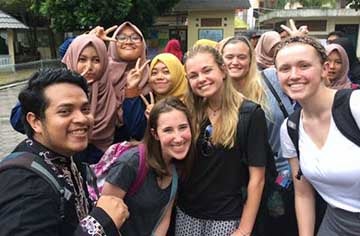KINGSTON, R.I – Feb. 10, 2017 – Traveling to new places can open our minds and expose the artificiality of human-imposed borders. And when travel includes multi-disciplinary approaches to education, our perspectives widen further. Just ask students and faculty within the University of Rhode Island’s Academic Health Collaborative.
“It’s eye opening and adds an element to education that you don’t get from reading articles or taking courses,” said physical therapy doctoral student Alison O’Brien of Exeter who participated in a global health program in Guatemala.
About 75 undergraduate and graduate students and several faculty members from the Collaborative’s colleges — Health Sciences, Nursing and Pharmacy — studied in Guatemala, Indonesia, Hawaii and Jamaica during J-Term in January. Students earned independent study or course credit in physical therapy, kinesiology, pharmacy, health studies or nursing.
“We’re working toward collaboration on international experiences that brings a uniform approach to interprofessional education and meets each discipline’s objectives for graduation,” said Michelle Palmer, assistant clinical professor of nursing.
She led a trip to Indonesia that included pharmacy, health studies and nursing students and focused on global health. Her group joined J-Term students studying biodiversity in Indonesia through the College of the Environment and Life Sciences and they hiked a mountain together. Palmer’s group examined social determinants (poverty, culture, geography) that were shortening the lives of local miners while the other students focused on geological aspects. “That was a quintessential moment of synergy between what they were doing and what we were doing,” she said.
Associate Professor Janice Hulme and Assistant Professor Jennifer Audette, both of the Department of Physical Therapy, led the Guatemala trip, which included immersive learning at hospitals, pharmacies and clinics for individuals with the disabilities.
“We worked to provide experiences of interest to the students from each of the different disciplines and evoke the social determinants of health care in different settings,” Audette said.
Elizabeth Alberg of Cumberland, a fourth-year doctor of pharmacy student who participated in the Guatemala trip, said this approach enhanced the travel experience. “It was great to not just be thinking about medications but to focus on people, their culture, how they live and how that affects their health,” she said.
Other students participated in exercise physiology studies in Oahu, Hawaii, led by Emily Clapham, associate professor of kinesiology; Linda Lamont, professor of exercise science; Shabnam Lateef, kinesiology lecturer; and Josh Smith, outcomes assessment and accreditation specialist in the School of Education. They provided surfing therapy for adults with disabilities, volunteered to provide ocean enrichment experiences with underprivileged children, attended lectures and collected and analyzed health data (heart rate, caloric expenditure, etc.). The hands-on interprofessional element allowed students to see their specialties in new ways, Clapham said.
The visit to Jamaican orphanages led by Christine McGrane, assistant professor of clinical nursing instruction, was part of an ongoing volunteer effort started by pharmacy students that included nursing and physical therapy students this year. They worked with children with disabilities and saw the impacts of poverty and scant resources. The trip served as a scouting exercise for a potentially new J-Term trip, McGrane said.
Audette also envisions additional travel programs that build on the groundwork laid this year. “We would like to offer learning opportunities for students from engineering, speech, nutrition, nursing …,” she said, noting boundless possibilities.

